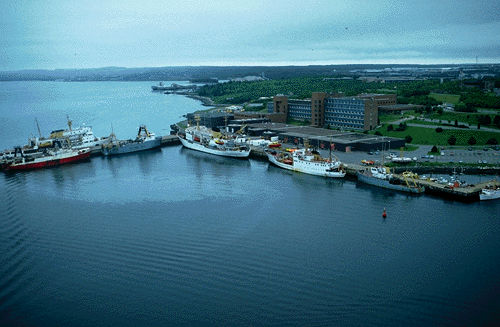Browse "Hydrology"
-
Article
Aquaculture
Aquaculture is the human-controlled cultivation and harvest of freshwater and marine plants and animals. Synonyms include fish farming, fish culture, mariculture, fish breeding and ocean ranching.
"https://development.thecanadianencyclopedia.ca/images/tce_placeholder.jpg?v=e9dca980c9bdb3aa11e832e7ea94f5d9" // resources/views/front/categories/view.blade.php
https://development.thecanadianencyclopedia.ca/images/tce_placeholder.jpg?v=e9dca980c9bdb3aa11e832e7ea94f5d9
-
Article
Aquarium
An aquarium is an organization devoted to the public exhibition of both freshwater and marine aquatic life. Exhibit species may include not only fish but also other aquatic animals.
"https://d2ttikhf7xbzbs.cloudfront.net/media/media/c35ea0a8-1bee-4455-afe5-0a9c88c26e8c.jpg" // resources/views/front/categories/view.blade.php
https://d2ttikhf7xbzbs.cloudfront.net/media/media/c35ea0a8-1bee-4455-afe5-0a9c88c26e8c.jpg
-
Article
Biological Oceanography
Biological Oceanography is a branch of oceanography that studies living organisms (ie, the biota) in the sea in relation to their environments.
"https://development.thecanadianencyclopedia.ca/images/tce_placeholder.jpg?v=e9dca980c9bdb3aa11e832e7ea94f5d9" // resources/views/front/categories/view.blade.php
https://development.thecanadianencyclopedia.ca/images/tce_placeholder.jpg?v=e9dca980c9bdb3aa11e832e7ea94f5d9
-
Macleans
Bottled Water Debate
This article was originally published in Maclean’s magazine on June 12, 2000. Partner content is not updated. On a remote hillside about 50 km northeast of Walkerton, Ont., springwater flows to the surface to form a clear pool. The area, surrounded by trees and about 1.5 km from the nearest farm, is fenced. Every month, Echo Springs Water Co. Ltd. employees pump about 4.
"https://development.thecanadianencyclopedia.ca/images/tce_placeholder.jpg?v=e9dca980c9bdb3aa11e832e7ea94f5d9" // resources/views/front/categories/view.blade.php
https://development.thecanadianencyclopedia.ca/images/tce_placeholder.jpg?v=e9dca980c9bdb3aa11e832e7ea94f5d9
-
Article
Brachiopoda
Brachiopoda, phylum of bivalved marine invertebrates, sometimes called lamp shells.
"https://development.thecanadianencyclopedia.ca/images/tce_placeholder.jpg?v=e9dca980c9bdb3aa11e832e7ea94f5d9" // resources/views/front/categories/view.blade.php
https://development.thecanadianencyclopedia.ca/images/tce_placeholder.jpg?v=e9dca980c9bdb3aa11e832e7ea94f5d9
-
Article
Brooks Aqueduct
The Brooks Aqueduct, located about 8 km southeast of Brooks, Alta, is considered by many to be one of the most significant engineering feats in Canada. It has been declared both a national and a provincial historic site.
"https://development.thecanadianencyclopedia.ca/images/tce_placeholder.jpg?v=e9dca980c9bdb3aa11e832e7ea94f5d9" // resources/views/front/categories/view.blade.php
https://development.thecanadianencyclopedia.ca/images/tce_placeholder.jpg?v=e9dca980c9bdb3aa11e832e7ea94f5d9
-
Article
Franklin Search
The disappearance in 1845 of Sir John Franklin and his crew in the Canadian Arctic set off the greatest rescue operation in the history of exploration. More than 30 expeditions over two decades would search by land and sea for clues as to his fate, in the process charting vast areas of the Canadian Arctic and mapping the complete route of the Northwest Passage. The search for clues continued into the 20th and 21st centuries. On 9 September 2014, it was announced that one of the expedition ships, later identified as the HMS Erebus, had been found off King William Island. On 12 September 2016, a team from the Arctic Research Foundation announced that they had located the Terror in Nunavut's Terror Bay, north of where the Erebus was found.
"https://d2ttikhf7xbzbs.cloudfront.net/media/media/61cafc88-db89-4bf1-a339-8d82f7bc6007.jpg" // resources/views/front/categories/view.blade.php
https://d2ttikhf7xbzbs.cloudfront.net/media/media/61cafc88-db89-4bf1-a339-8d82f7bc6007.jpg
-
Article
Freshwater Institute (FWI)
The Freshwater Institute, located on the University of Manitoba campus in Winnipeg, Man, is one of the world's leading research centres for freshwater and Arctic fisheries research.
"https://d2ttikhf7xbzbs.cloudfront.net/media/media/8ff204ea-7793-42b9-9f34-39964ccf0d12.jpg" // resources/views/front/categories/view.blade.php
https://d2ttikhf7xbzbs.cloudfront.net/media/media/8ff204ea-7793-42b9-9f34-39964ccf0d12.jpg
-
Article
Gardiner Dam
Gardiner Dam, located 100 km south of Saskatoon, is a 5 km long earth-fill structure towering 64 m above the South Saskatchewan riverbed.
"https://development.thecanadianencyclopedia.ca/images/tce_placeholder.jpg?v=e9dca980c9bdb3aa11e832e7ea94f5d9" // resources/views/front/categories/view.blade.php
https://development.thecanadianencyclopedia.ca/images/tce_placeholder.jpg?v=e9dca980c9bdb3aa11e832e7ea94f5d9
-
Article
Green Fishery
Green Fishery, the COD fishery carried out in Newfoundland and Labrador in which the product is preserved in salt on board the fishing ship to be dried later.
"https://development.thecanadianencyclopedia.ca/images/tce_placeholder.jpg?v=e9dca980c9bdb3aa11e832e7ea94f5d9" // resources/views/front/categories/view.blade.php
https://development.thecanadianencyclopedia.ca/images/tce_placeholder.jpg?v=e9dca980c9bdb3aa11e832e7ea94f5d9
-
Article
Hydrography
Hydrography is the science of surveying, charting and describing physical features of Oceans, seas, Rivers and Lakes.
"https://d2ttikhf7xbzbs.cloudfront.net/media/media/4aad02e3-72bd-400c-87ab-d1380ccad4dc.jpg" // resources/views/front/categories/view.blade.php
https://d2ttikhf7xbzbs.cloudfront.net/media/media/4aad02e3-72bd-400c-87ab-d1380ccad4dc.jpg
-
Article
Hydrology
Quantitative measurements of rainfall, snowfall, the rate at which water penetrates into and moves through soil, streamflow, the rise and fall of LAKE and GROUNDWATER levels, and the evapotranspiration of water into the atmosphere are vital.
"https://development.thecanadianencyclopedia.ca/images/tce_placeholder.jpg?v=e9dca980c9bdb3aa11e832e7ea94f5d9" // resources/views/front/categories/view.blade.php
https://development.thecanadianencyclopedia.ca/images/tce_placeholder.jpg?v=e9dca980c9bdb3aa11e832e7ea94f5d9
-
Article
Maritime Archaeology
British ColumbiaIn BC, most work has been carried out by the Underwater Archaeological Society of British Columbia (UASBC), a large, successful and mostly avocational group that was formed in 1975. The UASBC's has published seven regional shipwreck inventories.
"https://d2ttikhf7xbzbs.cloudfront.net/media/media/7ecaa63a-c7a6-4708-9151-98a099cb711d.jpg" // resources/views/front/categories/view.blade.php
https://d2ttikhf7xbzbs.cloudfront.net/media/media/7ecaa63a-c7a6-4708-9151-98a099cb711d.jpg
-
Article
Ocean Ranger
On 15 February 1982, the world's largest semisubmersible drill rig, Ocean Ranger, capsized and sank in a fierce storm on the Grand Banks with the loss of all 84 crew members, 56 of whom were Newfoundlanders.
"https://d2ttikhf7xbzbs.cloudfront.net/media/media/ba211737-bc16-4975-8314-d58fecb69691.jpg" // resources/views/front/categories/view.blade.php
https://d2ttikhf7xbzbs.cloudfront.net/media/media/ba211737-bc16-4975-8314-d58fecb69691.jpg
-
Article
Oceanography
From descriptive beginnings as the geography of the sea, oceanography has matured into a quantitative and multidisciplinary science bringing together experts from many basic fields.
"https://d2ttikhf7xbzbs.cloudfront.net/media/media/c584d662-8432-4be5-8f12-452cab3d3a57.jpg" // resources/views/front/categories/view.blade.php
https://d2ttikhf7xbzbs.cloudfront.net/media/media/c584d662-8432-4be5-8f12-452cab3d3a57.jpg
